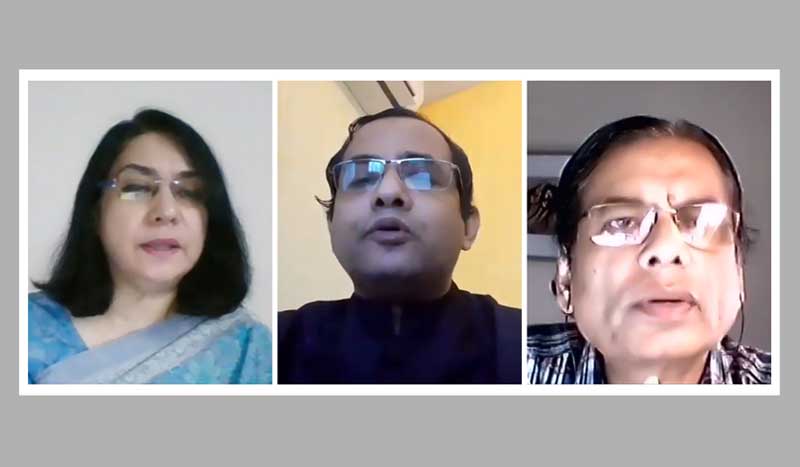
Upon reviewing the government’s recent initiatives of abandoning coal and consequently making comparative analysis of alternate options for energy-mix, the Centre for Policy Dialogue (CPD) has put forward a set of suggestions towards making the power sector environment-friendly and clean. CPD appreciates government’s initiative of abandoning coal; however, it suggests not to replace those by LNG-based power plants. Such a move would be a shift from using one form to another form of fossil fuel in power generation. The suggestions were made in a virtual media briefing held on 14 September 2020.
There are a total of 22 coal-based public and private power plants that have been identified with a total generation capacity of 23,236 MW, including plants which are currently under implementation and planning. According to a bold political statement made by the State Minister of the Ministry of Power Energy and Mineral Resources (MoPEMR) in a previous CPD webinar, the government is planning to shift from coal-based power generation to clean energy on the grounds that these environmentally polluting coal-based plants usually require a huge amount of land and has low efficiency level. The recent initiative of the MoPEMR of abandoning coal indicates that the political statement made by the Minister is going to be a major policy stance of the government on the power sector. While the initiative has been welcomed by CPD, the discussion raised concerns over the logics put forward by the Ministry endorsing LNG-based power plants as an alternative to coal-fired power plants in the country, the absence of comparative assessment with regard to renewable energy in replacing coal and how the promotion of LNG instead of renewable energy would cause Bangladesh’s leadership role in the Climate Vulnerable Forum (CVF) to be questionable and will raise major criticism.
https://www.facebook.com/cpd.org.bd/videos/1225644714480692/
Dr Khondaker Golam Moazzem, Research Director, CPD pointed out that the ministry’s initiative is not targeting the clean energy based power generation by abandoning coal and that replacing coal by LNG in power generation will be just shifting from using one form of fossil-fuel to another form. It was also mentioned that switching to LNG-based power generation would be a concern as LNG is not cleaner as claimed due to about the same level of carbon and other gas emissions as coal and it would unfortunately make Bangladesh’s power sector single source based (LNG based) as its share would rise to 70%. Considering the limitations of LNG-based power plants, the ministry should focus attention on adding renewable energy as an option as it is the cleanest energy and as it would save a huge amount of foreign currency by negating all costs other than the installation costs. Solar-based power plants were mentioned to be the ideal example of such a type of renewable energy. Unlike the past, solar-based power plants today cost lowest in major markets. It was recommended to not only shift coal-based plants but to shift all other sources of power generation to renewable energy. It was also pointed out that data related inconsistency in different official documents creates confusion regarding demand, generation, reserve capacity and exit of power plants etc.
As analysis of electricity demand and plan for power generation reveals a huge over-capacity in the post-COVID period, there is no need to rush to select LNG as an alternate for power generation as LNG is equally environmentally polluting. It is recommended for the government to renegotiate with organizations from other countries to make private investment in renewable power generation.
Dr Fahmida Khatun, Executive Director, CPD in her remarks mentioned that climate vulnerabilities and environmental pollution need to be given priority in the post-COVID recovery period. Since Bangladesh is vulnerable to the impact of climate change, investment in environment-friendly and cleaner energy-based power generation should be a priority for its long-term development. Professor Mustafizur Rahman, Distinguished Fellow CPD put emphasis on political will to make the power sector clean. Putting the example of India, Professor Rahman emphasized on changes in the incentive structure for promoting renewable energy and establishing sub-regional power grid between Bangladesh, India, Nepal and Bhutan.
Dr Khondaker Golam Moazzem, Research Director, CPD made a presentation at the media briefing while Dr Fahmida Khatun, Executive Director, CPD moderated the briefing session. The media briefing ended with a Q&A session with journalists.


